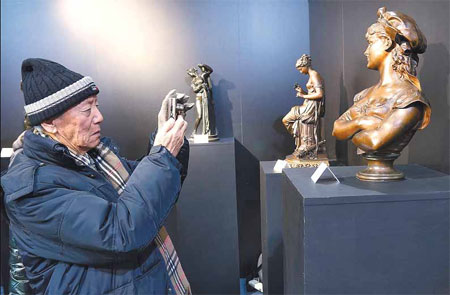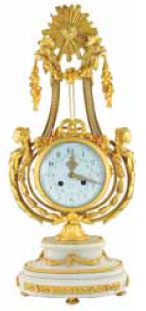Bidding on change
Updated: 2013-06-16 07:37
By Jules Quartly and Sun Li (China Daily)
|
||||||||
|
A man takes snapshots at the Beijing China Art International Fair in December last year, when China raked in 30 percent of the world's turnover of art and antiques, beating the US to become the world's No 1 market. Eighty percent of that volume comes from Beijing. Jules Quartly / China Daily |
China's first international auction puts on the block the opportunity for the industry to hammer out new national rules. Jules Quartly and Sun Li report.
China's first international auction in Xiamen signifies that curbs on the country's free trade of cultural artifacts may be going, going, gone. Huachen Auctions conducted the sale of 350 lots of Western art, furniture and silverware in Fujian province's free port, promoted by the online auction portal Epai Live and backed by the Association of Accredited Auctioneers (Triple-A), comprised of 21 British auctioneers. The April 21 sale is expected to open the door to more international auctions in China. It was also predicted that further government reform and the opening up of the market will overhaul regulations dating from New China's 1949 founding, preventing the sale abroad of "cultural relics" - which are, broadly speaking, antiques before 1911.
As the world's second largest auction market, after the United States, the Chinese mainland registered more than 47.8 billion yuan ($7.8 billion) in art and antiques sales in 2012, according to the domestic auction-tracking company Artron. For market-tracking company Artprice, it is the world's largest art auction marketplace.
Even so, international auctioneers have been largely locked out of the trade, and there are concerns the market is not as free, transparent and trustworthy as other major international auction environments.
Simply put, this means that while Chinese are busy buying up treasures from abroad, it is not reciprocal - and, even if it were, there would be little confidence in the domestic market because of the amount of fakes washing around.
Speaking before the Xiamen auction, Huachen's chairman and president Gan Xuejun says this situation has to change - and soon.
"I assume that in 10 to 20 years we will have a total free market, meaning that China's cultural relics can be sold overseas. And I do hope this can happen even sooner."
Gan says there were sound reasons at the time for preventing the sale of cultural relics, since they were being looted or sold abroad. But the situation has changed, and many items have either been bought back or even returned.
"The policy of putting restrictions on the export of cultural relics and at the same time allowing for their free import is outdated in the context of the internationalization of the auction market."
Now, Gan argues: "Chinese culture needs to be promoted, and artworks such as relics and antiques are the best medium for this."

 Michelle lays roses at site along Berlin Wall
Michelle lays roses at site along Berlin Wall
 Historic space lecture in Tiangong-1 commences
Historic space lecture in Tiangong-1 commences
 'Sopranos' Star James Gandolfini dead at 51
'Sopranos' Star James Gandolfini dead at 51
 UN: Number of refugees hits 18-year high
UN: Number of refugees hits 18-year high
 Slide: Jet exercises from aircraft carrier
Slide: Jet exercises from aircraft carrier
 Talks establish fishery hotline
Talks establish fishery hotline
 Foreign buyers eye Chinese drones
Foreign buyers eye Chinese drones
 UN chief hails China's peacekeepers
UN chief hails China's peacekeepers
Most Viewed
Editor's Picks

|

|

|

|

|

|
Today's Top News
Shenzhou X astronaut gives lecture today
US told to reassess duties on Chinese paper
Chinese seek greater share of satellite market
Russia rejects Obama's nuke cut proposal
US immigration bill sees Senate breakthrough
Brazilian cities revoke fare hikes
Moody's warns on China's local govt debt
Air quality in major cities drops in May
US Weekly

|

|










